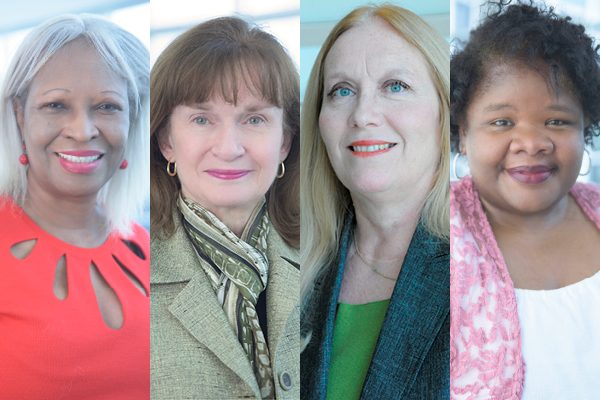
What is DTEC-TAG, and its predecessor DTEC?
As a leader in inclusive programming, UCF is the only institute of higher education asked to join the Delta Teacher Efficacy Campaign – Teachers Advocating to Lead Great Change (DTEC-TAG) initiative, part of a national effort of the Delta Research and Education Foundation (DREF) to ensure equitable outcomes for all children. The initiative’s focus is to develop “knowledge and advocacy among teacher leaders.” As representatives of UCF and the state of Florida, Professors Martha Lue Stewart, Suzanne Martin, Mary Little, and Associate Lecturer Constance Goodman bring to the initiative their vast knowledge and experience in scholarship, teaching, leadership, and service in education for high-needs student populations. DTEC-TAG is an extension of the Delta Teacher Efficacy Campaign (DTEC).
According to Stewart, DTEC provided nearly 300 novice teachers serving underserved students with “culturally responsive instructional strategies useful in meeting student needs in an inclusive setting.” The campaign also emphasized reflection, encouraging teachers to “deepen attentiveness to attitudes, values, beliefs, stereotypes, and experiences, which may fuel teacher expectations and student experiences.”
Little first joined the initiative after serving as an external investigator for DTEC. She said DTEC training results indicate teachers’ beliefs about their use of research-based strategies in student engagement, classroom management, and instructional strategies increased significantly after participating for four months.” With DTEC-TAG as an extension of DTEC, this training has the capacity to transform classrooms across the nation. Little emphasized the importance of teacher efficacy, defined as teacher confidence in their ability to positively affect student learning and behavior, whether or not students are difficult to teach or struggle with motivation. When this confidence increases, findings show teachers are more adept in planning and organization, and tend to tailor instruction based on student need. “Acquiring this sophisticated knowledge and developing a practice that is different from what teachers themselves experienced as students and as teachers requires learning opportunities that are sustained and supported.” DTEC-TAG builds on teachers’ cultural competency in the classroom, and because participants carry this knowledge to their own communities, the reach extends beyond the initial training.
DTEC-TAG is a 24-month pilot program that will train 35 educators on advocacy for marginalized student populations, as well as build a more comprehensive understanding of the Every Student Succeeds Act (ESSA), including how to better understand the legislation and what type of funding is available to implement the law. In addition to providing similar legislation to the No Child Left Behind Act — a quality education for all students — ESSA addresses areas where students need additional support, regardless of race, income, zip code, disability, home language, or background.
Goodman believes DTEC-TAG bridges the theory behind ESSA and praxis. “Education is a matter of life or death for many children in our public schools, specifically those children living in, or impacted by poverty. Laws and legislation such as ESSA do not automatically ensure compliance. This initiative is an example of the type of accountability measures needed to guarantee access, opportunity, and equitable outcomes.”
Martin says this initiative aligns with the life and career goals of all four professors, as well as the goals of all participants supporting DTEC-TAG. It is this common goal towards equal opportunities for the education of all children, and a passion for engagement in collaboration, that energizes support for this initiative, including major support from the Bill & Melinda Gates Foundation in partnership with the DREF, Delta Sigma Theta Sorority, The Education Trust, The Leadership Conference Education Fund, and Black Educators Rock.
Stewart believes DTEC-TAG will expand its reach. “With what we learned through our own work and through collective initiatives, we stand poised to advance the conversation and do our part to train and equip a generation of teacher educators and servant leaders who believe every child can learn and deserves a quality education.”

Our Advocates: Connectors, Information Specialists, Persuaders
All four UCF professors were invited to participate in DTEC-TAG, after their involvement in the success of DTEC and having spent much of their professional lives as advocates for social justice and equality in education and communities. Stewart explains, “We demonstrate service by modeling what service is and the power, the impact that resides in a single opportunity, like reading books to children and youth, serving as a mentor, volunteering at local polls, or participating in educational, historical, and cultural tours to enhance understanding of one’s history.”
Professor Martha Lue Stewart
Stewart has held local, regional, and national offices in the Delta Sigma Theta Sorority, and formerly served as a board member of DREF, the sorority’s national philanthropy organization. She was the first black woman at UCF to achieve rank as Professor. Her research and courses explore culturally responsive teaching and student engagement approaches for teaching and mentoring students from diverse backgrounds. In addition to teaching courses in Exceptional Student Education and the Supporting High Needs Populations certificate, she is a lead researcher on a state-funded grant designed to address preventative strategies in decreasing situational environmental circumstances that impede the growth and development of young black males. She also was founding director of the Teacher Education for America’s Minorities project to address recruitment, retention, and induction of people of color into teacher education. Stewart is also a first-generation college student.
“My father was a sharecropper and my mother, a domestic. Both worked long hours tilling the soil or working in homes. My father signed his name with an ‘x’ until I was 9 when I taught him how. My mother finished sixth grade but was smarter and more determined than most people I know. They shared a common rhetoric: ‘You don’t have to do this. You can do better.’“ Her parents’ support, in spite of their struggle, ignited a passion to provide opportunities that manifest in her life and work, including this initiative. “The dreams of my parents, DTEC-TAG, and related organizations I work with in the community all share a mission — opportunity. In some small way, it is my dream to give back, because so much has been given to me by so many.”
Associate Lecturer Constance Goodman
Goodman is program coordinator for Supporting Teacher Education Pre-professionals (STEP), which provides community, advising, and mentoring for incoming freshman who plan to major in education. The support and guidance she provides aspiring teachers, as well as DTEC-TAG and DTEC participants, reflect her appreciation for a high school guidance counselor who, she says, played a significant role in her attending college.
To Goodman, not only does this opportunity improve education, it improves the collective human experience. “I am confident any educator seriously interested in better outcomes for their students — to ensure a better tomorrow for us all — will want to be a part of this initiative. ‘Equitable outcomes in education’ is an aspect of social justice that calls for advocates of great change. In our efforts to prepare future educators and leaders, this initiative will offer opportunities for students on all levels to become advocates for themselves and others, as well as public servants.”
Professor Suzanne Martin
Martin currently directs the National Urban Special Education Leadership Initiative designed to address the critical gap between the traditional preparation of urban special education administrators and the skills, knowledge, and dispositions needed to help children learn by promoting accountability, enhancing parent involvement, using proven practices and materials, providing flexibility, and reducing paperwork burdens for teachers, states, and local school districts. She encourages students to get out of their own world and talk to other leaders who focus on serving high-needs student populations, like meeting urban education scholar and activist Professor Pedro Noguera, or participating in a one-week urban institute at Harvard University to meet leaders in the field from around the country to gather different perspectives. “Otherwise,” Martin says, “you’re just talking to yourself.”
“I was 5 years old when I started first grade. I didn’t speak in school. Now, you couldn’t shut me up once you got me through the door. But at school, I was terrified. The teacher set up the classroom in rows. The ‘most brilliant kids’ sat in the first row to the very left. The ‘okay kids’ sat in the second row. I was in the sixth row, the last row in the very back seat by myself because I was ‘a horrible child’ and ‘not bright.’” The teacher eventually called in Martin’s parents to inform them that their child would never read, that they should consider putting her in an institution. However, her parents knew Martin had been doing her brother’s homework since kindergarten. “It wasn’t about intellectual capacity. It had to do with bullying the smallest, quietest child in the classroom. When I turned 6 in first grade, I told my mother that I had to be a teacher, so no one else was treated like that.”
Professor Mary Little
As with the other three DTEC-TAG collaborators, Little carries substantial knowledge and experience to the initiative. She received a 1.25 million dollar, federally-funded grant for an intensive interventions project that focuses on transdisciplinary, data-based problem solving and service to children with academic and behavioral support needs, especially in underserved communities and schools. The project will involve more than 50 graduate students in applied research in school-based and clinical settings within Central Florida and national communities. In addition, Little and select colleagues in reading and math received a grant to enhance applied research and interventions in those subject areas at the Toni Jennings Exceptional Education Initiative Clinic.
“We need culturally responsive teaching practices in education, teachers who can advocate for their students who are marginalized and for their students’ families, to give voice to those who feel they have no voice. We are moving towards what Malcolm Gladwell termed the tipping point, from his book of the same name. You have all these starts, but if you collect them, and you communicate so people can see the connections, then the initiative can build its own inertia.”
The Delta Teacher Efficacy Campaign – Teachers Advocating to Lead Great Change (DTEC-TAG) initiative is funded by the Bill & Melinda Gates Foundation in partnership with the Delta Research and Education Foundation, Delta Sigma Theta Sorority, The Education Trust, The Leadership Conference Education Fund, and Black Educators Rock.